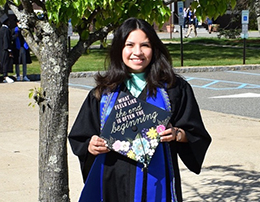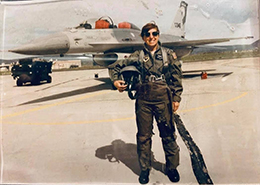Alumni Stories
Contact Information
Alumni Engagement
Santa Rita Hall, 1st Floor
Phone: (973) 290-4703
alumni@steu.edu
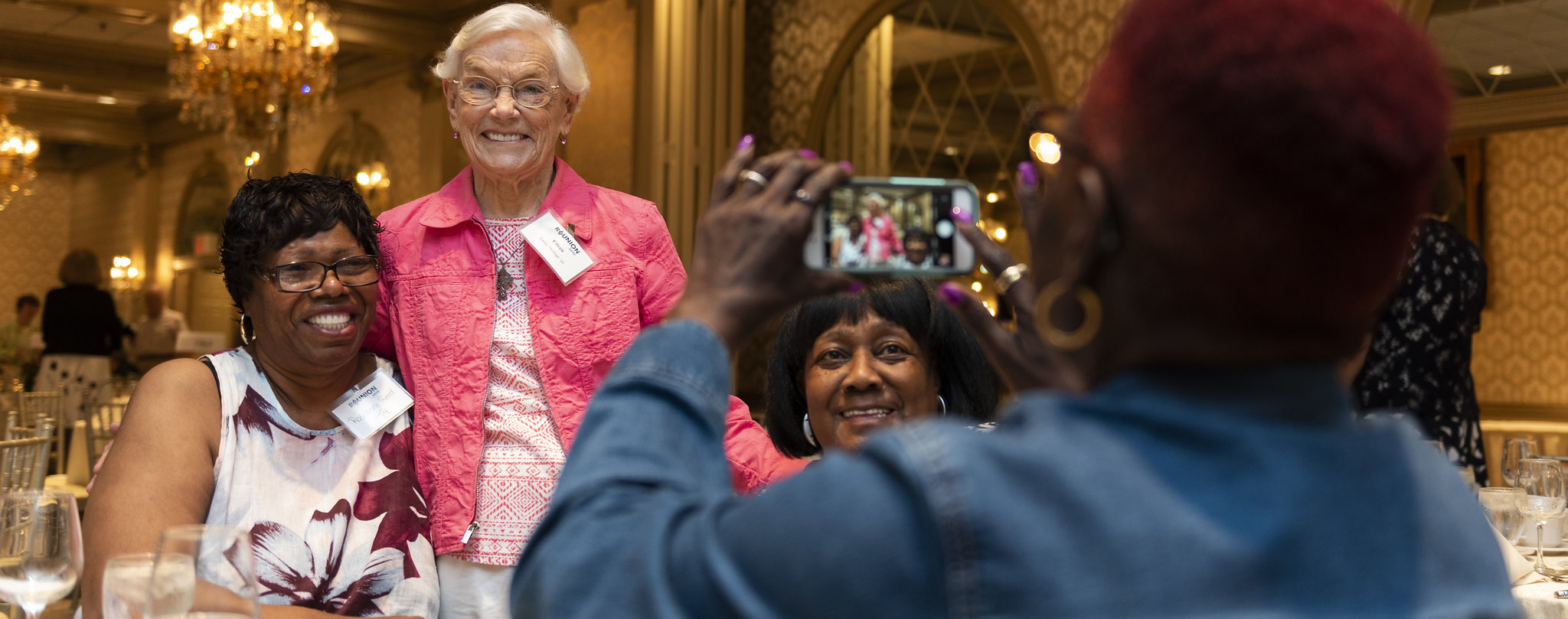
Saint Elizabeth University is comprised of a diverse body of alumni who excel in every discipline. The Alum of the Month shines a spotlight on the personal and professional accomplishments of our alumni. If you would like to nominate yourself or a classmate of yours as our next Alum of the Month, then fill out the nomination form.
Jonadad Fequiere, ‘17

For our August Alum of the Month, we are spotlighting Jonadad Fequiere, ‘17, this year’s guest speaker at SEU’s opening Convocation. As an immigrant and first generation student, Jonadad understands the need to feel a sense of culture and belonging on college campuses.
While at SEU, Jonadad studied business administration and communication. She shared in her Convocation speech that the experiences she had in college greatly influenced her future.
“I was undecided my first year and had no idea who or what I wanted to be for the rest of my life,” said Jonadad. “My values changed as I learned more about myself and the ways I wanted to contribute to the world and serve others. My time at SEU prepared me to pursue my MBA following graduation and a career in higher education.”
Read ArticleHayley Holzhacker, ‘18
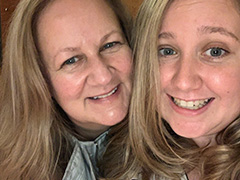
Sylvia Rosamond Finnegan, ‘28, was encouraged to apply to Saint E’s by a Sister of Mercy and teacher at John Bapst High School in Bangor, Maine. The Sister was an advocate for women to achieve a higher education degree and knew that Sylvia would receive a world class education at the institution. Sylvia’s graduation sparked an almost century-long legacy for one New England family.
“The four generations of women in my family who have attended Saint E’s forged a path that will forever inspire me,” says Hayley Holzhacker, ‘18. “Knowing that I continued their legacy is something that has truly empowered me.”
Read ArticleRyan McKay, '22
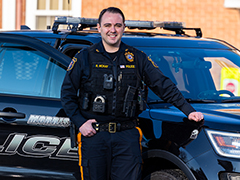
Early in his career, Ryan McKay, ‘22, worked as a police dispatcher at the Morris County Communications Center. Answering 911 calls, Ryan remembers the countless times he provided CPR instructions to callers over the phone. With one dispatcher in charge of up to five towns in the county, and nearly eight monitors flashing on each desk at a time, the intensity of the job is not for the faint of heart. For Ryan, the job sparked a lifetime of interest in helping others.
“It was certainly a foot-in-the-door job experience for me as it solidified my goal of being on the other side of the radio as a police officer,” says Ryan. “You really have to excel at being able to multitask and handle the stress that comes with it.”
For the past decade, Ryan has been with the Morris Plains Police Department in positions of increasing responsibility. He was most recently promoted to a lieutenant position in October of 2021.
Read ArticleKhajayah Little, '22
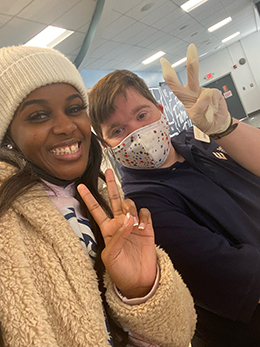
Khajayah Little ‘22, was among the first in her family to graduate from high school so her decision to attend college was highly unexpected.
“A lot of my dad’s family didn’t make it to their high school graduation so attending mine was a huge step for our family,” explains Khajayah. “It was an even bigger shock when I told them I was going to college but I just knew I wasn’t finished yet.”
Inspired by time she spent with her cousins who have Down syndrome and autism, Khajayah decided to pursue a degree in Health Science with the intention of continuing at SEU to earn her master’s in Applied Behavior Analysis.
“Society overlooks children with disabilities but they are just like us,” says Khajayah, who plans on dedicating her life to helping children thrive. “They may function differently than we do but they are no different than us. We are all one.”
While Khajayah is set on using her education to improve the world, she almost didn’t earn her degree. Originally a student at a larger New Jersey institution, Khajayah struggled immensely during her freshman and sophomore years. As a first-generation college student, Khajayah could not figure out what was expected of her.
“I wasn’t doing well and I was falling behind on the standards I set for myself,” recalls Khajayah. “There was no guidance at my first college, I was completely on my own and I started to think that maybe college wasn’t meant for me after all.”
Read ArticleAdditional Alumni Stories
A Pioneer in her Field
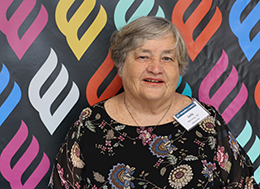 Judy Messing was a computer scientist before the computer science major was even invented.
Judy Messing was a computer scientist before the computer science major was even invented.
“At the time, companies looking for computer programmers hired math, music or philosophy majors because we all had courses in logic,” recalls Judy, who earned her bachelor’s in mathematics in 1960.
Fascinated by the intellectual challenges in this burgeoning field, Judy was able to put her talents to work writing diagnostic programs for an experimental line of computers called UNIVAC (Universal Automatic Computer) shortly upon graduating. In the years to follow, Judy would work in different capacities for multiple computer-related companies and agencies.
Some of her accomplishments include programming large displays of military information, coding war game simulations, coding systems for the U.S. Army, testing early email programs and looking at solutions for protecting classified information. Judy even co-wrote a research paper on a mechanism to track access to computer files called “Beyond the Pale of MAC and DAC.”
“I’ve really enjoyed my working life,” says Judy. “I always worked with very smart people, had interesting projects, and was never bored.”
In her personal life, Judy’s achievements are just as impressive. As a young mother, she ran the first food program of the ecumenical organization ALIVE in Alexandria, Virginia. Every day, she would receive calls from churches with the names of families who were in need. Then, she would pack the food and call on volunteers to deliver it.
However, that was just the beginning of Judy’s relationship with charitable causes. Following the death of their daughter Carol in 2008, Judy and her late husband Phillip began to fund a Mentored Investigator Award for the Ovarian Cancer Research Alliance in her memory. Additionally, Judy and Phillip funded several scholarships to aide students at Gumbo Limbo Nature Center, Boston University and Saint Elizabeth University.
“Both of us place great importance on the value of education,” says Judy. “Phil worked his way through college by driving a cab and I had a full scholarship to SEU.
In 2019, the pair established the Class of 1960 scholarship at SEU, in hopes of offering all students the ability to earn an education.
“I am the oldest of eight children and never would have been able to afford SEU without the scholarship I was granted,” recalls Judy. “And SEU gave me a great education, deepened my Catholic faith, provided a strong example of resourceful women and was a place where I gained life-long friendships.”
 Anne Lanute, ‘98, was just eight years old when she first stepped onto SEU’s campus.
Her ballet company had rented space at the University, exposing Anne to life at Saint
E’s on a routine basis.
Anne Lanute, ‘98, was just eight years old when she first stepped onto SEU’s campus.
Her ballet company had rented space at the University, exposing Anne to life at Saint
E’s on a routine basis.
“I remember going to my dance lessons and just seeing all the college girls hanging out, having fun,” says Anne. “It was a formative moment for me and I just knew I wanted to have that experience too.”
Despite relocating to Chicago, Anne never forgot about SEU. In fact, when it came time to apply for colleges, Saint Elizabeth University was the first on her list. Anne fell in love with SEU’s supportive faculty and encouraging educational environment that stoked her passion for learning. A self-proclaimed nerd, Anne had to ask for permission to take more classes after completing her psychology degree and ended up earning an individualized major in writing.
“Graduating from SEU was such a big day for me,” explains Anne. “I was the first in my family to go to college because the opportunity just hadn’t been there for anybody else. Being able to plow that road for my family was wonderful.”
While interested in education, Anne’s parents were denied the ability to complete college due to family responsibilities. Her mother had to stop attending nursing school to care for her small children and her father could not sacrifice his career for a degree.
“Earning my degree was a gift to my parents because they felt they missed out on that experience. It was something that meant so much to our entire family,” recalls Anne. “My son is even asking me about colleges and, now that the school’s co-ed, he can have that experience too.”
A perpetual student, Anne has channeled her love of learning into her hobbies and personal interests. She believes that constantly learning introduces people to concepts they never knew they would find fascinating. This curiosity for the world actually led Anne to her career as a pastry chef.
“I wasn’t one of those people who had been baking and cooking my whole life, I would always take the instant cooking dough approach,” says Anne. “But I started baking as a hobby and soon realized I wanted to make it my career.”
After attending culinary school, Anne began working for Auguste Escoffier, an entirely online school of culinary arts that was just opening. A groundbreaking concept at the time, the virtual learning format challenged Anne to reconceptualize teaching and think creatively, a skill she honed at SEU.
“All the teachers at SEU allowed us to be as creative as possible and that’s stuck with me throughout my career,” says Anne, an executive chef for Escoffier. “Teaching virtually required me to utilize that creativity to help students better visualize techniques without me physically being with them.”
While Anne did not pursue a career in psychology or writing, she utilizes interpersonal and professional skills acquired at SEU every single day.
Inspiring the Youth
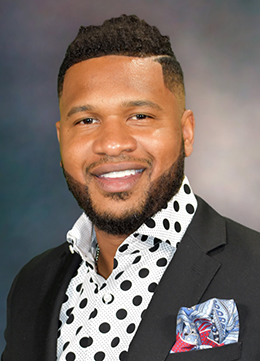
“When I was in first grade, my teacher tied me to a chair with a jump rope and left me there for more than an hour,” explains Dr. David Jefferson Jr., ‘21. While this abuse initially made David weary of educators, he soon realized that his calling was to become the person he needed most in that moment.
“My time in education has gone from trauma to triumph,” explains David, who recently earned his doctorate in educational leadership at SEU. “That experience set the backdrop for me working with at-risk students who have also had challenges in education.”
A multi-vocational leader, every aspect of David’s professional, vocational and personal life has centered on assisting and inspiring young people to overcome obstacles blocking their success.
In 2014, President Barack Obama tapped David to lead the Obama Foundation’s My Brother’s Keeper Alliance (MBK Alliance) in the city of Newark. Despite being in the midst of earning his master’s in divinity from Princeton University, David took a three-year leave of absence to lead this initiative. Dedicated to building safe and supportive communities where boys and young men of color feel valued, David helped these young people realize their potential through promoting effective programs and policies.
“The desire to help others stems from my mentors, great heroes and sheroes, that instilled in me a desire to serve and give back,” says David, a cum-laude graduate of Morehouse College. “I feel God has put me in a position to help others achieve their goals.”
As a third-generation Baptist preacher, David literally grew up with the tenants of compassion, love and service that surrounded the church. Passed from his grandfather to his father, their legacy inspired David to make his own mark on the world. Presently serving as a pastor at the Community Church of East Williston and engaged in family ministry at Metropolitan Baptist Church, David is intent on mentoring young people. In fact, he lives his life in accordance with Jeremiah 29:11, a Biblical passage that reads, “For I [God] know the plans I have for you.”
“I strongly believe everyone has a plan for their life,” says David, a recipient of the Kenyon J. Wildrick award in Homiletics. “As an academic advisor, adjunct professor and educational specialist for Kean University, my job is literally to help my students find their own path in life. When that path is obstructed, I find ways to break down doors in the system.”
Whether he’s inspiring young people in the church or the classroom, David has utilized the knowledge he acquired in every stage of his life to become the educator, mentor and teacher he needed as a child.
Reviving Heritage Food Ways
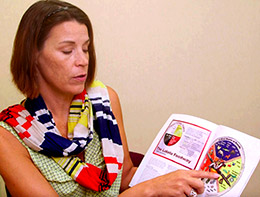
A ring of red and a loaf of white ushered in an era of unprecedented illness and disease among members of the Lakota tribe. Representative of the refined carbohydrates and processed meat found in a bologna sandwich, this pithy phrase illustrates the movement from traditional food ways to more modern manners of consumption.
“The bologna sandwich was an alternative to standing at the stove, cooking all day,” explains Kibbe McGaa Brown, ‘93 a Lieutenant Commander in the U.S. Public Health Service and a graduate of SEU’s dietetic internship program. “Eating this way became a matter of status because some people had the ability to afford convenience.”
However, with ease of preparation came an entirely new problem: high blood sugar. In the early 1990s, before the diabetes epidemic was well understood, Kibbe began working as a dietician for Pine Ridge Indian Reservation. She had witnessed the devastating impacts of diabetes on her aunts and uncles and was determined to help other Native people with the condition. Not knowing where to start fighting this disease, Kibbe turned to her elders.
“While at Pine Ridge, I had access to the Grey Eagle Society, [a group of Lakota elders], who taught me about traditional food ways,” says Kibbe. “I learned that there was a radical shift in food intake for Native people in a relatively short amount of time and the elders taught me to consider how our ancestors ate instead.”
Using both her elders’ wisdom and formal education, Kibbe began to reimagine how nutrition education was taught to Native people. Instead of relying on the food pyramid, which was the only model at the time, Kibbe looked for a symbol more reflective of heritage food ways.
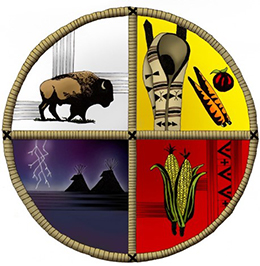 “The circle, with four directions, is a cultural symbol,” describes Kibbe. “Known
as the medicine wheel, the west is water, the north is the buffalo, the east is for
harvesting and gathering berries and plants while the south is for cultigens such
as corn, beans, and potatoes.”
“The circle, with four directions, is a cultural symbol,” describes Kibbe. “Known
as the medicine wheel, the west is water, the north is the buffalo, the east is for
harvesting and gathering berries and plants while the south is for cultigens such
as corn, beans, and potatoes.”
By developing materials that mirrored that traditional food system in contemporary ways, Kibbe was able to steer people away from refined carbohydrates and toward bone broth, plants, and other ancient food ways. As a national nutrition consultant for Indian Health Services (IHS) in the Division of Diabetes Treatment and Prevention, Kibbe is able to measure the impact of nutritional education, traditional diets, and other methods of intervention.
As reported by the IHS, Native Americans have the highest rates of Type II diabetes in the United States. However, as explained in the IHS’ Special Diabetes Program For Indians report to congress, diabetes-related deaths, hospitalizations for uncontrolled diabetes, and diabetic eye disease had all decreased. Additionally, for the first time, diabetes prevalence in American Indians and Alaska Native People decreased (and did so consistently) for four years; a feat never accomplished by the general U.S. population nor any other U.S. racial or ethnic group.
Kibbe was able to play a part in this reduction due to the education she received at Saint Elizabeth University.
“Studying at SEU equipped me to succeed in my career in Indian Health by preparing me to serve in clinical, community, and foodservice settings,” says Kibbe.
Gilliam Ojedis-Lucas, ’20, began her clinical practice in student teaching during the height of the COVID-19 pandemic. Shortly after Gilliam’s clinical practice ended, she was hired as a full-time first grade teacher and was presented with another unique challenge: teaching entirely online.
“Whenever the other teachers at the school found out that I was doing my student teaching, they would all respond in the same way,” says Gilliam. “They would look shocked and say: ‘You’re doing it now? Well, you’re definitely going to be ready when you’re finished.’ And they were right, I was ready.”
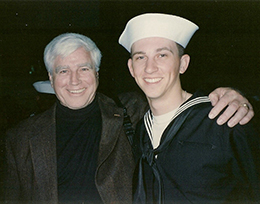 Matthew Thomas, ‘20, served in the US Navy from 1997 to 2001 and worked as a Hull
Maintenance Technician Fireman during his years of service.
Matthew Thomas, ‘20, served in the US Navy from 1997 to 2001 and worked as a Hull
Maintenance Technician Fireman during his years of service.
“My maternal grandfather Major David A. Thomas was the real reason why I served. I spent a lot of my time as a child with my grandpa and would always recount his stories of his time in the Air Force,” says Matthew. “He was my inspiration and hero.”
Following his time in the military, Matthew spent three years working as an EMT in Los Angeles, CA, where he met his wife and fellow SEU alum Heather. Working as an EMT later inspired Matthew to complete his degree in Health Administration at SEU.
“I am so happy that I attended SEU and had a wonderful time there. The professors that I met along the way were some of the greatest educators that I have had in my college career,” says Matthew.
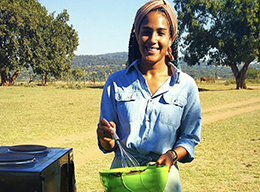 "I joined the Peace Corps to better understand the world," explains Nada Mays, who
served in the Kingdom of eSwatini, a small landlocked country in the southern region
of Africa. "As a Black and Palestinian person, I am very aware of how some regions
of the world are portrayed in a falsely negative light."
"I joined the Peace Corps to better understand the world," explains Nada Mays, who
served in the Kingdom of eSwatini, a small landlocked country in the southern region
of Africa. "As a Black and Palestinian person, I am very aware of how some regions
of the world are portrayed in a falsely negative light."
While living in eSwatini for two years, Nada gained first-hand experience with the
HIV pandemic. When she returned to the U.S., she was offered a position with a local
community agency. In this role, she worked with incarcerated residents who were about
to be released and counseled them about living with HIV.
"Being released after 30 years can be like stepping into a whole new world because
long terms of incarceration leaves residents with large gaps of knowledge," explains
Nada. "It's important that they know how to stay safe and what resources are available
to support them in staying healthy."
She would spend her days helping these incarcerated individuals living with HIV gain
access to community-based organizations that could provide long-term support. Additionally,
she would help them make doctor's appointments, submit documentation for housing,
applying for SNAP benefits and help them with emergency assistance.
"This work really opened my eyes to the prejudice and stigma people face during and
after incarceration," says Nada.
Interested in continuing to build a career in public health, Nada decided to enter
SEU's master's in nutrition/dietetic internship program. She was drawn to the community
and public health nutrition curriculum because it covered the social determinants
of health, such as systemic racism.
But Nada's interest in the field of nutrition has a more personal beginning.
"I grew up in a home where we made everything from scratch. My childhood friends used
to come over and eat the Palestinian dishes my mom prepared but as I grew older, I
found cooking to be therapeutic," says Nada. "I'm earning my master's because I want
to spread nutrition education and promote health equity in underserved communities."
Serving With Honor: Aiming High
American flags waved from every street corner, marching bands played patriotic tunes while confetti streamed over large crowds and Dr. Marion Hardy, '60, stood in the middle of it all.
It was June of 1944. The Allied Forces had just invaded Normandy, securing a victory
that would ultimately lead to the end of World War II, and Hardy's mother took her
to New York to celebrate. In that moment, even though she was only a child, Hardy's
admiration for the military was born.
"If I could, I would reenlist today," says Hardy, who spent several decades serving
in the United States Air Force and retired as a full colonel. During her military
career, Hardy filled positions that had never before been held by a woman. She was
one of the first to fly in an F16 fighter aircraft as a Flight Surgeon, the first
to hold the position of Commander, Chief of Hospital Services and one of the first
to be appointed State Air Surgeon of New Hampshire.
"I never tried to hide my identity. I'm a woman and I expected respect," says Hardy.
"I never made excuses, I volunteered for unpleasant jobs and knew I could compete
with the best of them. I was proud of who I was and made it very clear who was in
charge."
Hardy's efforts earned her an excess of 16 medals throughout her military career,
including the Legion of Merit Medal which is the third highest medal awarded during
peace time.
As a civilian, Hardy also dedicated her life to the medical field. Her passion for
this career was fueled by several tragic examples of the failures of medicine.
"My 13-year-old brother died from a fractured skull and brain hemorrhage due to a
fall, my grandmother died in childbirth and another family member died from blood
poisoning," recalls Hardy. "These sights deeply affected me and I always thought,
'Maybe I could do better.'"
After studying biology at the Saint Elizabeth University, Hardy went on to earn a
master's in human anatomy and a doctorate in osteopathy. For many years, she worked
as an osteopathic physician and specialized in internal medicine, emergency medicine,
drug addiction and travel medicine.
Hardy's ingenuity and ability to think quickly has saved countless lives in both her
military and medical career. Her actions have certainly proved that she could do better.
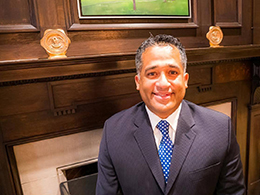
Alex Guzman Defends Doctoral Dissertation at SEU
Growing up in a Spanish speaking household, Dr. Alex Guzmán was in English Language
Learner (ELL) programs until the third grade. Guzmán's personal experience as an ELL
student spurred his interest in researching this population for his dissertation.
"English Language Learners are a linguistically, culturally and educationally diverse
population who face barriers on their first day of school," explains Alex, the former
principal of Middlesex High School in the Borough of Middlesex. "This diversity demands
schools to address their needs."
Alex intends to use knowledge attained through earning his doctorate in educational leadership at SEU to create these equitable learning environments and encourage his peers to
do the same. His desire to improve educational standards stems from his mother.
"My mom was always a strong advocate for education and hard work," says Alex. "She
taught me to never get comfortable and always strive to do better or learn more."
While education has become Alex's calling in life, his first love was science. In
fact, he even earned his Bachelor of Science in Chemistry and had hopes of becoming
an engineer. However, growing up in a single-parent household, his family couldn't
afford to send him to an engineering university.
"Continuing to higher education is difficult for low-income families. My mom, my sister,
and I worked tirelessly to put me through college," says Alex, who channeled his love
of science into becoming a chemistry and physics teacher. "I was the first to graduate
from college, the first to earn a master's and now a doctorate."
Alex credits SEU with creating a learning environment that challenged his thinking,
allowed him to find success through failure and prepared him to achieve his ambitions.
In the future, Alex hopes to inspire more Latinx students to pursue science careers
and teach in higher education.
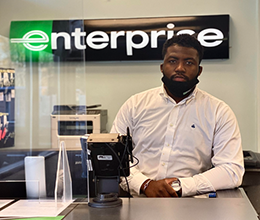
Internship Leads to Full-Time Position
"My internship gave me a head start in my career," says Thomas Michael, '20.
Last year, when he was nearing the end of his college career, Thomas realized that he wanted more hands-on experience. He became very interested in acquiring the experience and expertise necessary to operate a business effectively and turned to his advisors for assistance. As a psychology major with a business minor, Michael was looking for an internship that joined his two passions.
Shortly after consulting with his advisors and the Experiential Learning Center, Thomas was accepted into a semester-long management trainee program at Enterprise Rent-A-Car. In this position, he had the opportunity to partake in sales calls, delve into marketing tactics, work with insurance companies and used his psychology degree to enhance his ability to interact with customers.
"I learned how a multi-million-dollar business operates and the value of good customer service," explains Thomas. "People can rent a car anywhere but great costumer service makes them more likely to return to Enterprise."
Due to the skills and relationships Thomas developed as an intern, just one month after graduating from SEU he was able to secure a full-time position as a manager-in-training at Enterprise. This experience pushed Thomas to become more reflective, ambitious and confident in his abilities despite the uncertainty of the economy.
"During one of the most devastating health crises in our nation's history, Enterprise has helped me gain financial security," says Thomas. "And I wouldn't have gotten that chance without SEU."
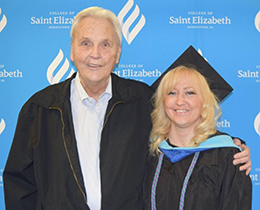 Student Profile: Heidi Biller, '18, M.A. in Educational Leadership
Student Profile: Heidi Biller, '18, M.A. in Educational Leadership
Ten years ago, Heidi Biller promised her seriously ill father Roger that he would
see her graduate from the Saint Elizabeth University. Unfortunately, Roger was unable
to attend Heidi's college graduation due to complications from a liver transplant.
Now, exactly a decade later, Heidi fulfilled her promise and Roger proudly watched
as his daughter earned a master's in educational leadership from SEU.
"SEU isn't just about academics," says Heidi. "It's about family and it's about support.
SEU was the only place I would ever even think of going for my master's."
For Heidi, SEU literally is family. In 1993, Roger himself became the first male valedictorian
to graduate from, what was then called, the College's "night and weekend" program.
Roger's enthusiasm for the College is what encouraged Heidi to pursue her undergraduate
degree in English and education at SEU.
"I wanted to be a teacher ever since I was five years old," says Heidi. "When I started
working as a teacher, I started seeing the leadership side of education and how important
it was to support teachers."
To further honor her father during graduation, Heidi decorated her mortarboard, or
cap, with the phrase, "What's the magic words?" As a child, Roger would ask Heidi
this question and she'd reply, "I love Daddy," to which he'd respond, "I love Heidi."
At SEU, you receive more than just an education. You develop personal relationships
with professors, gain confidence to chase your dreams and are given unconditional
support.
Congratulations, Heidi and Roger!

